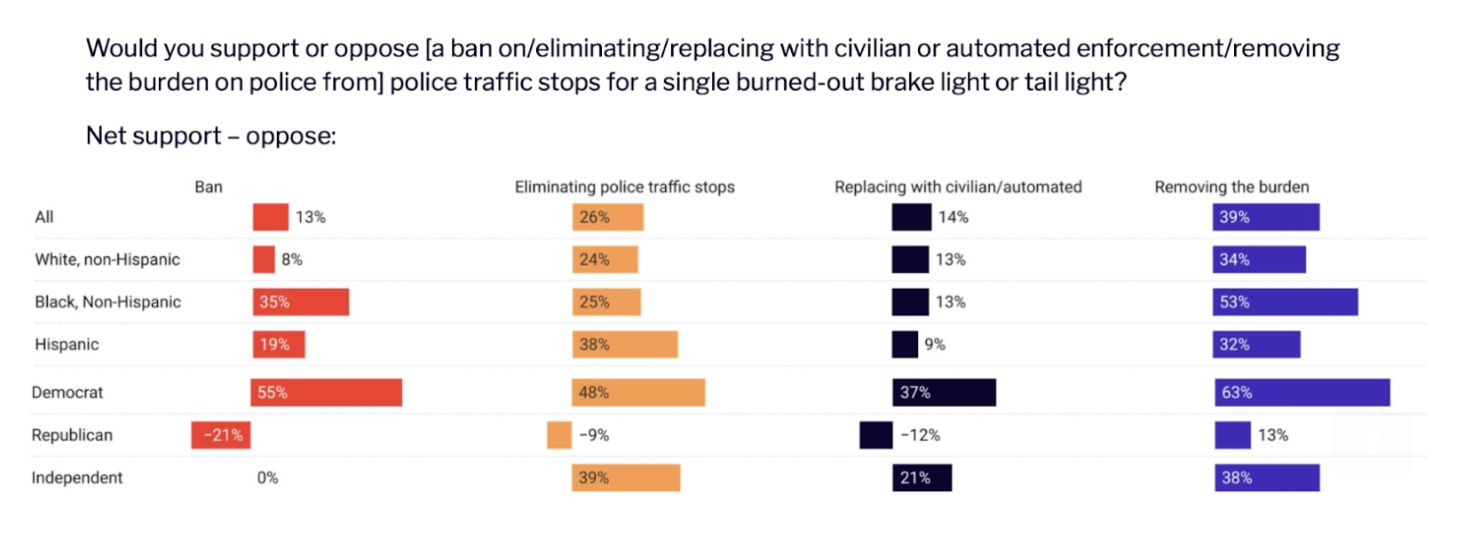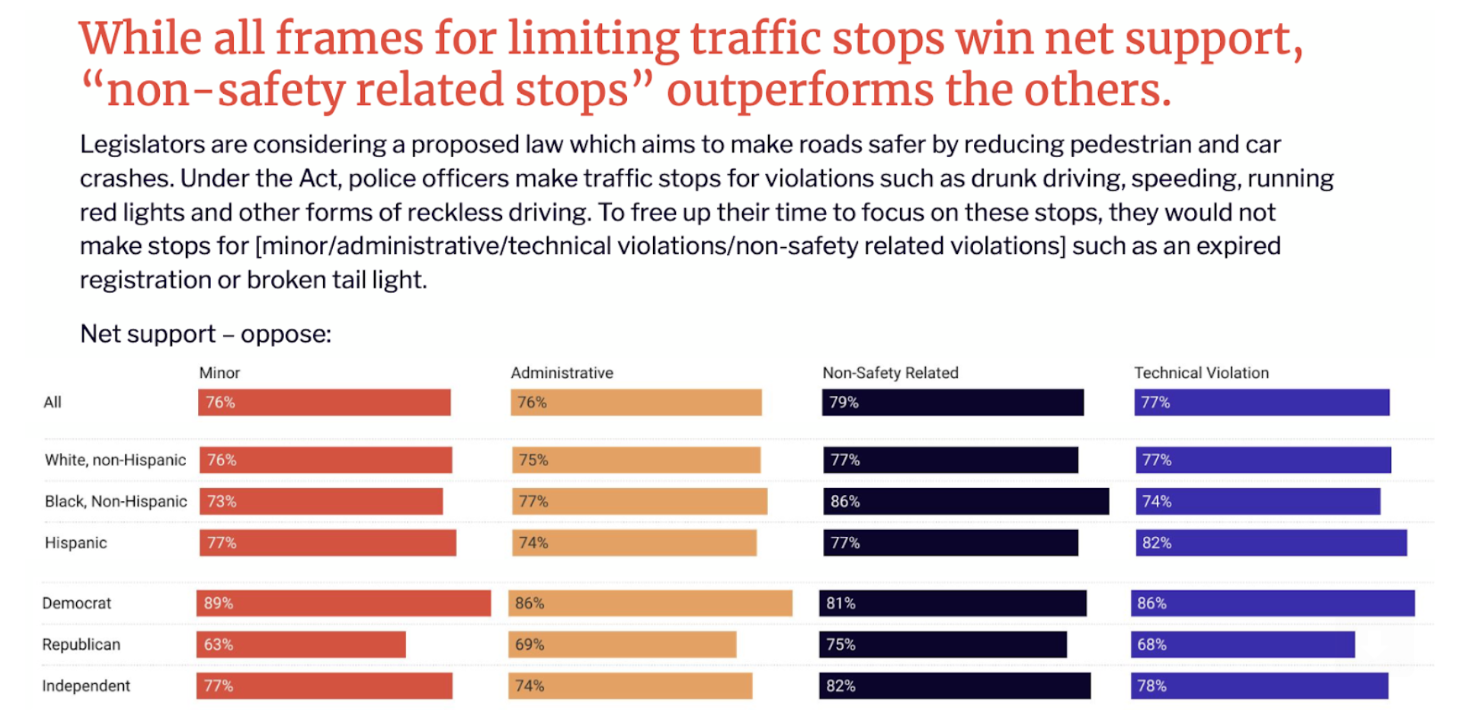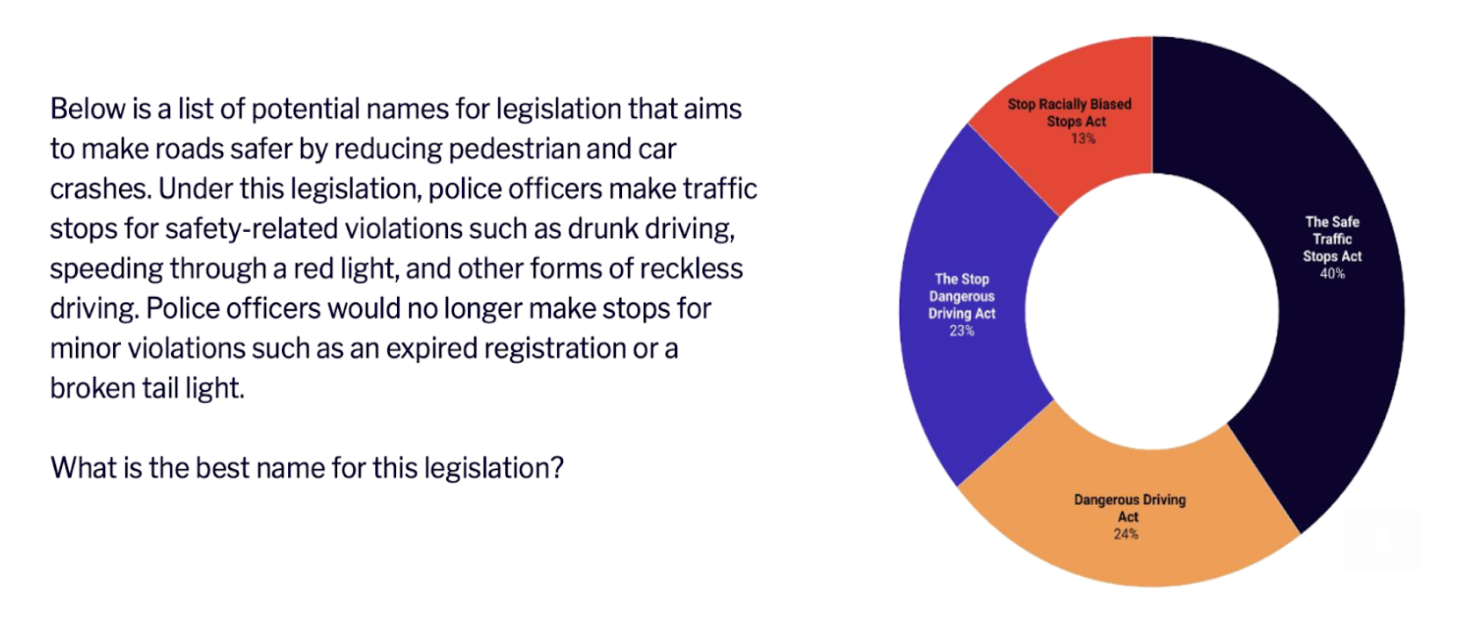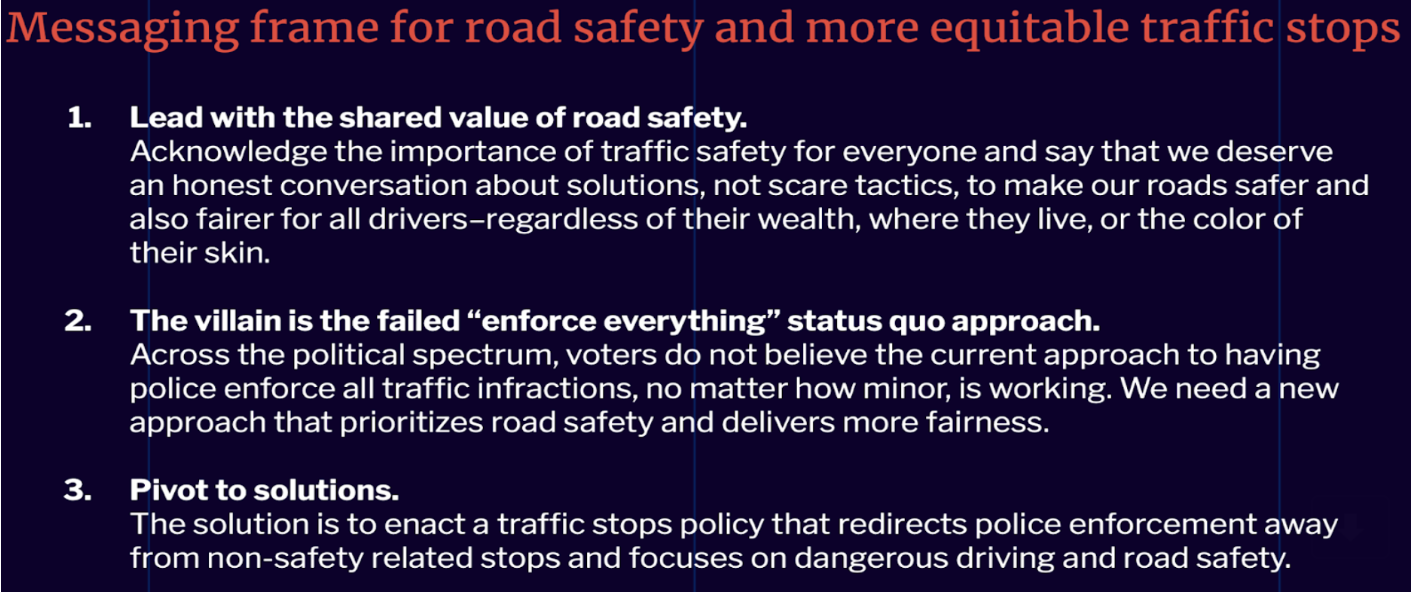Three Things To Read This Week
1. New Message Testing On Traffic Stops
The Vera Institute of Justice recently published a new polling deck—Winning the Narrative on Safer Roads and More Equitable Traffic Stops: Findings From National Polling and Public Opinion Research—that contains extensive framing advice for talking about how to shift police capacity towards the traffic stops that most impact public safety (for example, drunk driving).
Here are three key findings:
Framing a redistribution of traffic stops away from police officers as “removing the burden on police” triples support—net +39 versus net +13—compared to framing the policy shift as a “ban” on police traffic stops.
Only minor differences emerge when comparing different labels for the categories of stops that police would no longer make. However, “non-safety related stops” inched above other labels such as “minor”, “administrative” or “technical violations.”
“The Safe Traffic Stops Act” is the name for potential legislation on the topic that best resonates with voters.
As Safer Cities previously reported, voters strongly support rethinking road safety and the role of police traffic stops. For example, polling from Safer Cities previously found:
Vera’s research examined how best to title such legislation in order to effectively communicate its intent to voters. “The Safe Traffic Stops Act” emerged as the far-and-away most compelling “potential name for legislation that aims to make roads safer by reducing pedestrian and car crashes.”
And, finally, here is Vera’s three-step framework for talking about shifting police capacity towards the traffic stops that most impact public safety:
2. Albuquerque Continues To Modernize Its Public Safety Infrastructure.
Safer Cities has extensively covered Albuquerque’s Community Safety Department (here, here, here, and here), which is “an unarmed civilian force that takes a public health approach to protecting public safety” by deploying “different types of first responders, including a ‘community responder’ division, which “responds to minor injuries or incapacitation, abandoned vehicles, non-injury accidents, needle pickups, or other calls for service in the community.”
Yet, when a responder from the Community Safety Department encounters a person who needs more help than she can give on the scene—and especially when the help needed is a stable place to stay—there often is not a constructive place to bring that person.
Now, though, the city is slowly trying to change that. As Vince Rodriguez reports for KOAT News 7 in Albuquerque, “the city has completed construction on the Gateway Housing Navigation Center” which “will have 100 beds available” to “help individuals transition to stable housing[.]” That means “the Albuquerque Community Safety Department and other homeless service providers will be able to refer people to the Gateway” to begin the journey to stable housing. Moreover, Gateway will also offer wraparound services “including Medicaid enrollment and health care referrals, pet services, and employment navigation.”
The Gateway Housing Center is only one example of the kinds of facilities that cities across the country are building as better alternatives to first responders bringing people who need help to jails or emergency rooms. For example: crisis stabilization centers give people experiencing an acute mental health crisis a warm bed and a connection to services; sobering centers give people who are intoxicated a place to sober up until they are not a danger to themselves or others; and trauma recovery centers provide a place for crime survivors and their families to connect to mental health, relocation, and job resources that they need to achieve stability after life-altering violence.
3. Narcan Access Keeps Growing Across The Country:
“Narcan Dispensers Installed On Chicago Sidewalks To Combat Opioid Deaths.” Fox News reports on the new effort putting “life-saving medication as close as the nearest newspaper stand” as “opioid deaths in Cook County are at an all-time high.” State Representative La Shawn Ford explained the importance of easy Narcan access when the new dispensers were announced: “When you have a tool—a medicine that actually saves lives—I mean I love doctors but this tool is more powerful than anything that we know that could save a life. Narcan-naloxone will save a life.” Here’s a look at the new dispensers from Fox:
In California, a Bakersfield medical center installed a Narcan vending machine to provide free access to the medicine, Robert Price reports for the local NBC affiliate. Dr. Fiona Axelsson, a physician at the medical center, told the news station that a half dozen more vending machines will be coming to other medical center locations in the county over the next few months. “The coolest thing about it is that it’s 100% free… it’s also completely confidential, so when you scan the QR code, if you don’t want to use your name, you don’t have to use your name.”
In Colorado, the city and county of Broomfield is providing Narcan “in an effort to prevent fatal overdoses… at no cost to the community,” Corbett Stevenson reports for the Broomfield Enterprise. As the program begins to roll out, the medicine is available at the library and municipal court buildings.
In Oklahoma, for Fox News’ local affiliate, Jamison Keefover reports on the state’s launch of “the biggest campaign in the US to provide free naloxone and fentanyl test strips in vending machines… the 40 vending machines are stocked around Oklahoma with free products available immediately to anyone.”
In Wisconsin, Waukesha County expects to “install 200 overdose aid kits by the end of the year,” Megan Woolard reports for the Milwaukee Journal Sentinel. Each kit includes “Narcan…fentanyl testing strips, a breathing mask and gloves, as well as instructions for drug administration [and] recovery support and treatment resources…”
In Michigan, the Ingham County Health Department installed a Narcan vending machine at the county Human Services Building that is “free to use and available to all members of the community… dispenses Naloxone kits… fentanyl test strips, first aid kits, CPR mouth shields, and more,” Ciana Reddy reports for WLNS.





